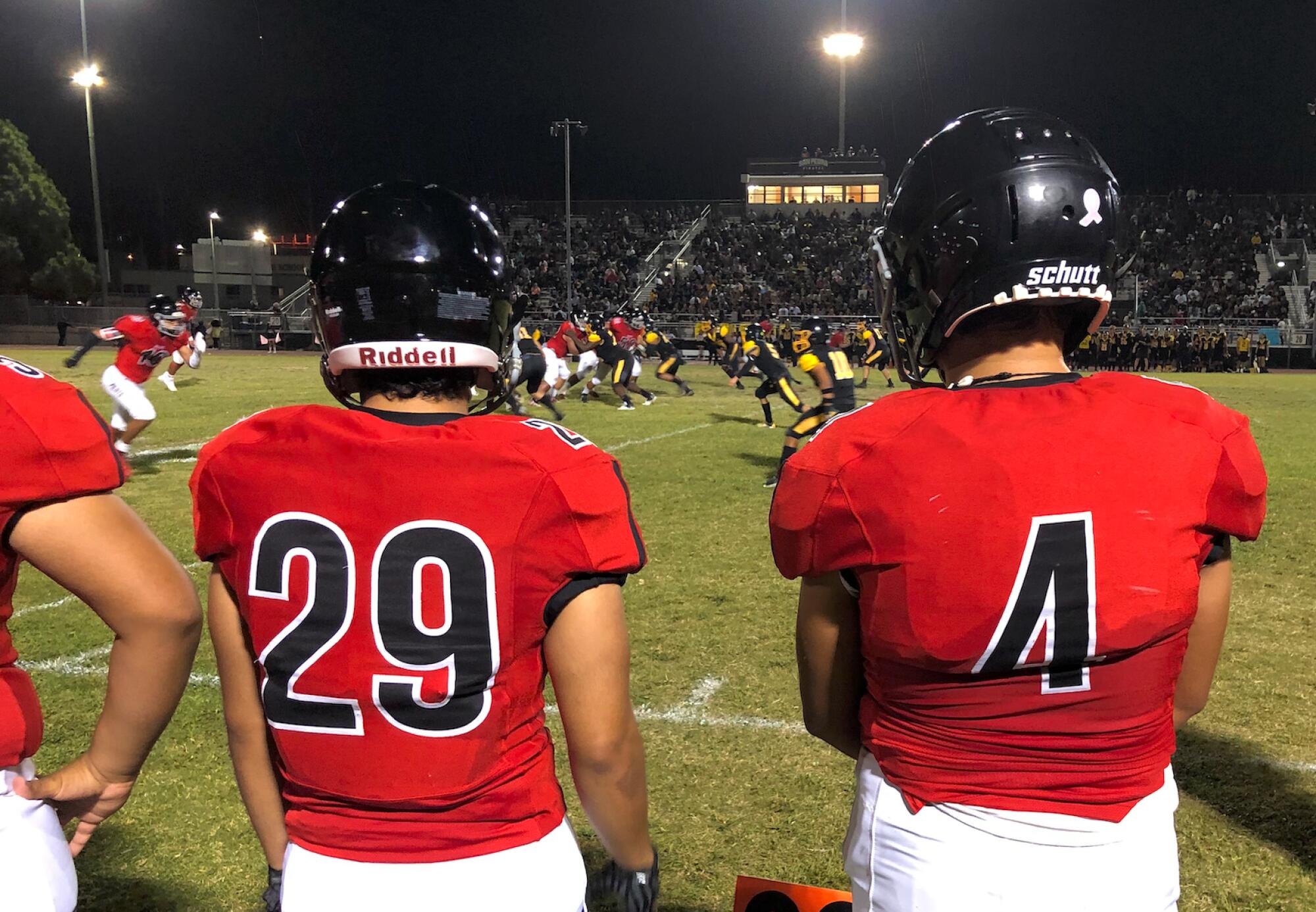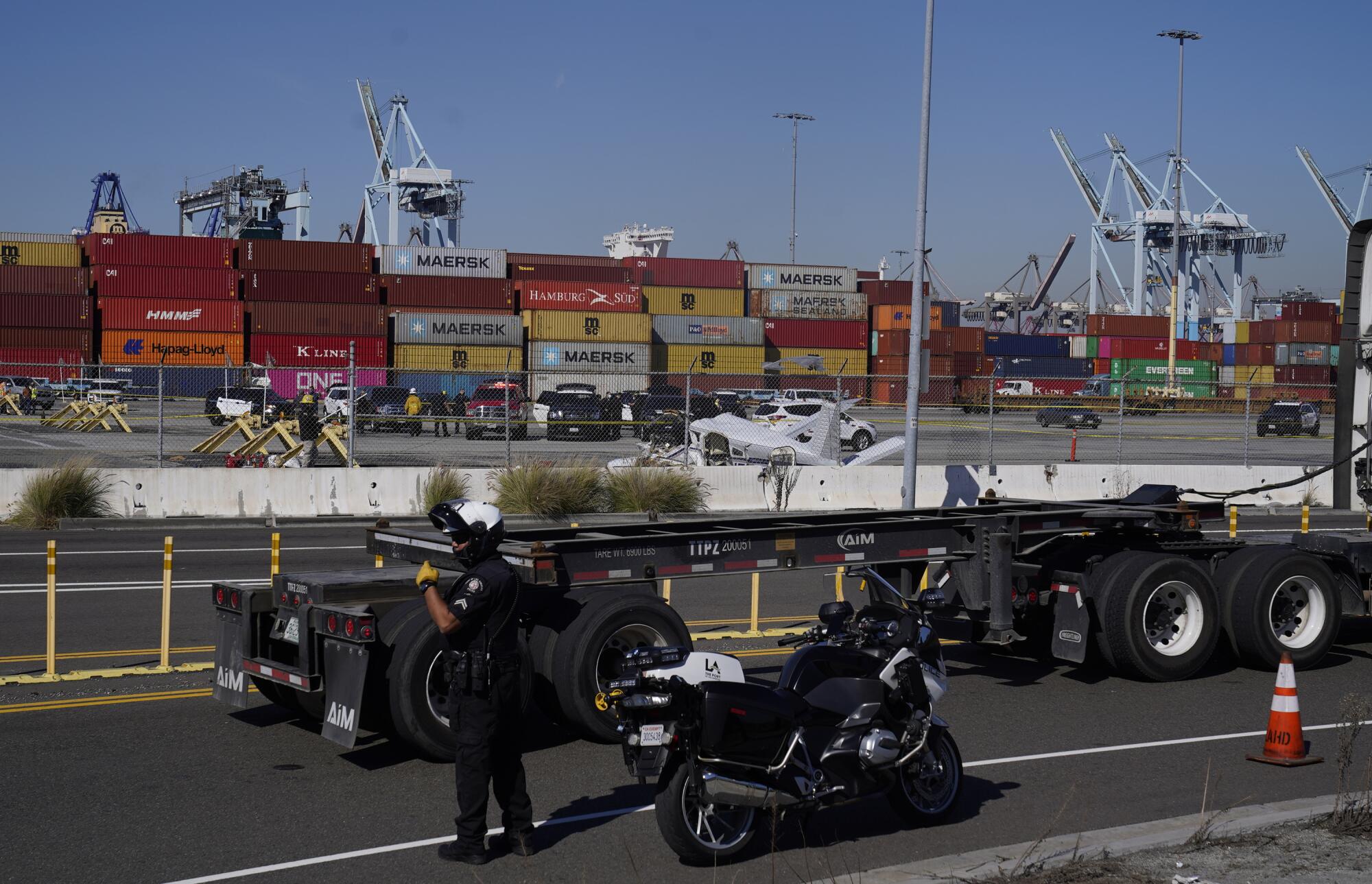
The school bands assembled Friday night in neat formation on opposite sides of San Pedro High’s patchy field, primed by a single conductor.
Behind them, hands over hearts, stood the San Pedro and Banning football teams, gazing at each other across 160 feet of grass. At their backs were seas of black and yellow or red and white, San Pedro and Wilmington communities out in full force to support their local schools.
It’s a rivalry with decades of history in the harbor region of Los Angeles. Wilmington and San Pedro natives carry an area pride that erupts one day a year during a high school football game. Loud boos will ensue. Players shove each other and chirp relentlessly after whistles. Yet many of those opposing fans in the bleachers come together the next day to resume their jobs on the docks.
As the lights of the looming cranes down by the harbor twinkled in the distance, the two bands struck up their instruments at the same time, the familiar booming notes of the national anthem echoing across the field.
The notes of their trombones and clarinets were slightly different. But the drumline — the heartbeat — was very much the same.
::
If someone from San Pedro steps foot into Wilmington, Banning coach Raymond Grajeda said, the community will instantly know, and vice versa.
Grajeda, who’s lived in Wilmington all 38 years of his life, said there’s a stigma. At the same time, the separate blue-collar areas mingle constantly within the harbor area. They’re longshoremen. Construction workers. Engineers.
“At a certain point we’ll say words like ‘hate,’ ‘I can’t stand,’ but at the end of the day, these guys are brothers,” Grajeda said. “They work with each other every day on the port, they shake each other’s hands.”
San Pedro High coach Corey Miller had a similar description of the relationship.
“One week out of the year, we hate each other,” Miller said, “and 51 weeks out of the year we like each other.”
That week dates back generations. Youth sports programs pit the communities against each other before their kids hit puberty, and the rivalry is passed on because, as Grajeda said, those in the communities grow up with family friends so close they’re like “cousins.”
Alumni of the schools will come by the docks to bet on games, and Miller has seen pictures of workers on the docks chalking up the scores on the cranes overlooking the bay.

“They take it personal,” said Rodney Jackson, the father of San Pedro quarterback Aidan Jackson.
Historically, the rivalry has been evenly split. In the 1970s and 80s, Miller said, Banning dominated until Mike Walsh stepped in as coach to turn the San Pedro program into a powerhouse. In 2019 and 2020, San Pedro blew out Banning. But the teams came into Friday’s game neck-and-neck as the top programs in the City Section.
This edition of the rivalry was one for all time. In a game that lasted nearly three hours, the two sides battled back and forth, neither holding a lead of more than a touchdown. Players on both sides pumped their arms to the crowd to raise decibel levels after every score, and trash talk was exchanged until the final seconds.
This atmosphere is special. There’s an understanding in it — and a shared mentality.
“I think that’s why both communities are so prideful — we feel left out,” Miller said. “We feel an obligation that if we don’t take care of each other, nobody else will.”
::
In 2001, San Pedro and Wilmington pushed for secession from the city of Los Angeles, feeling City Hall wasn’t properly servicing the needs of their districts. But, overshadowed by other topics, that effort didn’t even make it to a vote on the 2002 ballot.
The 110 freeway extends the city limits of Los Angeles down to the port area — a “heartbeat line,” as Grajeda calls it. The distance from the city itself, at times, has led to disconnect and frustration from harbor residents, who don’t always feel respected by the city despite the harbor’s labor force being a key part of the economy.
“It feels like being born here, you’re just fighting to prove you have a life,” Grajeda said.


Miller said the schools are so far removed that they hardly ever receive transfers — only increasing community pride given that players are almost all homegrown.
“The big talk of my kids is to let everybody know we’re not bottom-feeders,” Grajeda said. “We’re a community of family, respect; we’re a community of wealth.”
That pride buzzed within every play Friday. In the first half, Banning star running back Jakob Galloway ran amok, galloping for big runs and a pair of touchdowns. He finished the night with 284 yards and one stiff-arm on a 42-yard score so mean it shocked a chirping San Pedro sideline into silence.
“It got to me,” Galloway said of the Pirates’ trash talk, “but it also helped me finish through the game.”
Aidan Jackson, meanwhile, was all over the field, accounting for four touchdowns. Banning’s ground game and San Pedro’s passing traded heavyweight blows all night. With a minute left and the Pilots up by a point, San Pedro recovered a fumble to put it in position to win — but in an improbable twist, Banning blocked a short field-goal try with seconds remaining and returned it for a touchdown to seal a 48-41 win.
Get our high school sports newsletter
Prep Rally is devoted to the SoCal high school sports experience, bringing you scores, stories and a behind-the-scenes look at what makes prep sports so popular.
You may occasionally receive promotional content from the Los Angeles Times.
As the crowd exploded, Banning players streaked across the field in celebration as Pirates threw their helmets in disgust. For one night, one week, the rivalry tipped back toward Wilmington.
But in a few days’ time, it will hardly matter.
“Tomorrow, guess what we’re going to do?” Grajeda said. “We’re going to eat together. We’re going to be on the docks working together. You see this guy — ‘Hey, give me my hundred dollars and let’s go to lunch.’ And that’s what it’s about.”
More to Read
Get our high school sports newsletter
Prep Rally is devoted to the SoCal high school sports experience, bringing you scores, stories and a behind-the-scenes look at what makes prep sports so popular.
You may occasionally receive promotional content from the Los Angeles Times.






